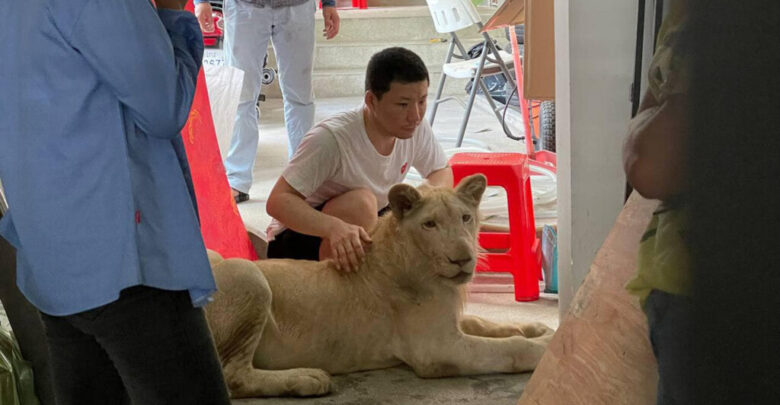

Police in Cambodia have seized a young lion that was kept illegally by a man who gave himself away by posting videos of his “pet” online.
Under the operation, led by the Forestry Administration and assisted by volunteers from the Wildlife Alliance, police raided a property in Boeng Keng Kang district in Phnom Penh on June 27 after receiving reports the occupant was keeping a lion.
Officials learned of the case in late April when they saw video posted on TikTok of the big cat being bathed and cuddled, according to local media.

Inside the villa, the officials found the 18-month-old, 154-pound male lion. Its owner had allegedly been raising the lion at his property since it was an infant. The owner is believed to have imported the wild animal from abroad.
“The owner had removed the lion’s canine teeth and severely clipped his claws. Such modifications can dramatically reduce wild cats’ quality of life,” the Wildlife Alliance stated.
Local media reported the big cat consumed some 13 pounds of raw meat every day inside the villa.
Owning wild animals is illegal in Cambodia.
“In Cambodia, the law does generally not permit wild animals to be kept as pets, particularly those classified as rare and endangered species. Despite this, the pet trade runs rampant across the country,” according to the Wildlife Alliance website.
“The combination of a lack of law enforcement, ease of purchasing, and a disproportionate penalty all provide the perfect storm for a rising wildlife pet trade in Cambodia. In particular, a recent change in tactics by traffickers means a considerable proportion of the illegal pet trade is assumed to happen through social media, in particular Facebook, by far Cambodia’s most popular social-media platform.”

The Wildlife Alliance said the lion has been transferred to the Phnom Tamao Wildlife Rescue Centre, “where he will be housed in the future in a wilderness-like enclosure and provided professional care,” the Wildlife Alliance said.
It was unknown whether the lion’s owner will face charges.
Lions are listed as “vulnerable” on the International Union for the Conservation of Nature (IUCN) Red List of Threatened Species. As of the last global assessment in 2014, the population numbered between 23,000 and 29,000.
Lions are native to sub-Saharan Africa and western India; their habitat includes forest, savanna, shrubland, grassland and desert.
Loss of habitat and conflicts with humans are believed to pose the greatest threats to the species’ survival.
(Edited by Judith Isacoff and Fern Siegel)
The post Roar Courage: Police Rescue Huge Lion Being Kept As A Family Pet appeared first on Zenger News.






